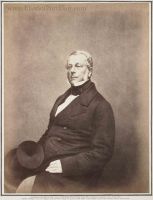| Notes |

--- "North Devon Journal" 07 Nov 1850, page 8:
ST. GERMANS' AGRICULTURAL SOCIETY
The present Earl of St. Germans, better known as Lord Eliot, formerly Secretary for Ireland, met the Agricultural Society of his neighbourhood on Thursday last. As his lordship is a man of considerable mark, and was formerly a Protectionist, our readers may be interested in knowing what are his present opinions upon agriculture, and we therefore insert his speech, as follows:--
I have, on former occasions, called upon you to drink "Prosperity to the St. Germans' Farmers' Club," and have exhorted you to promote its success by all and every means within your power; but I have never done it on any previous occasion with greater earnestness than upon the present, because I feel that the times call for additional exertion. Now, gentlemen, I believe that, throughout the length and the breadth of the land, a spirit has gone forth, exhorting the farmer to develop the capabilities of the soil to the greatest extent, and to increase to the utmost its productive powers -- (hear, hear). Those who make no effort to keep pace with the march of improvement, will not only be left far behind, but will be less able than those who do to cope with the difficulties to which I have adverted -- (hear, hear). Gentlemen, good farming -- by which I do not mean unnecessarily expensive farming -- will frequently pay, when bad farming will not -- (hear, hear). I take good farming to consist in clean and careful cultivation -- in the application of a proper quantity of suitable measure -- in a judicious rotation of crops adapted to the peculiarities of the soil -- and in a judicious outlay of capital to an amount proportioned to the return which it can fairly be expected to make. In these respects, undoubtedly, science does lend its aid; and very useful and important aid it gives us. It teaches the farmer to analyse different manures -- to ascertain their different properties -- and so to learn how far they are, or are not, adapted to the soil which he has to cultivate; but, as Mr. Roseveare has very properly observed, science of itself is not sufficient. Experience must go hand in hand with science, practice with theory; and it is because I think societies such as this particularly well calculated to apply this test of experience to science, that I think them so important. It is not given to science to penetrate all the mysteries of nature -- to lay open all her processes, or to discover all her secrets -- there are some things which it is impossible for science to find out, or to make clear, until the test of practical experience has been applied to them -- (hear, hear). When I look at the vast additions which have been made, within a comparatively short period, to the number of the productions of other soils and other climates, which have become naturalised in this, I do not despair of seeing that number very considerably increased. It is not 70 or 80 years ago, that the cultivation of the turnip became general in the country; my grandfather was one of the first, if not the first, to introduce it here; and when we see that there is now no part of the country in which it is more successfully cultivated than in this, we may fairly hope to obtain equal excellence in other crops -- (hear, hear). I am not a practical man. I do not pretend to give an opinion worth acting on, but I will venture to call your attention to the single subject of flax. Within the last few years the cultivation of flax has spread with extraordinary rapidity throughout the whole of Ireland; and it is there found to be a most valuable crop, the fibre being applied to the manufacture of linen, and the seed as food for cattle. It is impossible for me to say that the soil and climate of this country are as well suited to the growth of flax as the climate and soil of Ireland. I am far from saying so; but I do think that it is worth the while of our agriculturists to enquire how far it may be introduced here with success. Beyond this I will not go; but when I consider the circumstances of the times, and that we are now exposed to the competition of other countries, I feel that no means should be left untried to develop to the utmost the resources and capabilities of the soil. I do not mean to lay down any rule, or to direct you to any course as that which ought to be pursued; but we should not lose sight of the fact that the immediate district is situated within a few miles of the three towns -- I might almost call them the one town, of Plymouth, Devonport, and Stonehouse -- with their population of 100,000; and that there must be, in these towns, with their large and increasing population, a great and growing demand for your meant, milk, butter, turnips, and the other products of the soil. With this market you have frequent communication by water, which you have lately made more available by the introduction of steam; and I may be permitted to remark, in passing, that I think the farmers of the neighbourhood will very much consult their own interests by making that communication by steam as convenient and expeditious as possible. You should not throw away one of the advantages which you possess. If you find that one description of crop will make a better return than another, you should not be so wedded to the practice or routine of former years as to discard it. And without wishing, I repeat, to prescribe any particular course, I think that every man in his own sphere might try some few experiments, and that at these meetings, where men who are engaged in a common pursuit meet together for the advancement of a common object, the greatest possible benefit might be derived from the communication, by individuals, of experiments tried by themselves upon a small scale. With respect to the meeting of to-day, I think that nothing is more calculated to improve our husbandry than the encouragement given by this and similar societies to good ploughing. The time may come when steam will supersede the plough; but, until that day arrives, as good husbandry depends upon the proper culture of the soil, so nothing will do more to promote it than the encouragement of those who plough well -- (hear, hear). It is further important, as showing that we realise and appreciate the exertions of our poorer neighbours, and we may hope that the rewards which have been given, in this assembly, to the successful competitors in this day's trial, will stimulate them to still further efforts.
|
 [1]
[1]  [2]
[2]  [3]
[3]  [4]
[4]  [5]
[5] 




 [6]
[6]  [7]
[7]  [7]
[7]  [8]
[8]  [9]
[9]  [7]
[7] 
 [10]
[10] 
 [11]
[11] 
 [12]
[12]  [7]
[7]  [7]
[7] 
 [7]
[7]  [13]
[13]  [14]
[14] 
 [15]
[15] 
 Occupation
Occupation [16]
[16] 
 Occupation
Occupation
 [17]
[17]  [18]
[18]  Occupation
Occupation [16]
[16]  [19]
[19]  [20]
[20]  [21]
[21]  [22]
[22] 

 , d. 19 Jan 1845, Port Eliot, St. Germans, Cornwall
, d. 19 Jan 1845, Port Eliot, St. Germans, Cornwall  (Age 77 years)
(Age 77 years)  , d. 24 Mar 1806, Madeira
, d. 24 Mar 1806, Madeira  (Age 36 years)
(Age 36 years)  , d. 02 Jul 1856, 36 Dover Street, Piccadilly, St. George, Hanover Square, London
, d. 02 Jul 1856, 36 Dover Street, Piccadilly, St. George, Hanover Square, London  (Age 53 years)
(Age 53 years)  Married
Married [23]
[23]  , d. 15 Jan 1911, 38 Eccleston Square, Westminster, London
, d. 15 Jan 1911, 38 Eccleston Square, Westminster, London  (Age 85 years)
(Age 85 years) , d. 26 Nov 1864, Port Eliot, St. Germans, Cornwall
, d. 26 Nov 1864, Port Eliot, St. Germans, Cornwall  (Age 37 years)
(Age 37 years) , d. 05 Nov 1854, Battle of Inkerman, Crimea in the Ukraine
, d. 05 Nov 1854, Battle of Inkerman, Crimea in the Ukraine  (Age 26 years)
(Age 26 years) , d. 19 Mar 1881, 13 Grosvenor Gardens, London
, d. 19 Mar 1881, 13 Grosvenor Gardens, London  (Age 51 years)
(Age 51 years) , d. 16 Jan 1832, Port Eliot, St. Germans, Cornwall
, d. 16 Jan 1832, Port Eliot, St. Germans, Cornwall  (Age 0 years)
(Age 0 years) , d. 16 Mar 1835, 47 Dover St., Piccadilly, St. James, Westminster
, d. 16 Mar 1835, 47 Dover St., Piccadilly, St. James, Westminster  (Age 1 years)
(Age 1 years) , d. 24 Sep 1911, Port Eliot, St. Germans, Cornwall
, d. 24 Sep 1911, Port Eliot, St. Germans, Cornwall  (Age 76 years)
(Age 76 years) , d. 22 May 1901, 8 Onslow-gardens, Kensington, London
, d. 22 May 1901, 8 Onslow-gardens, Kensington, London  (Age 61 years)
(Age 61 years)


